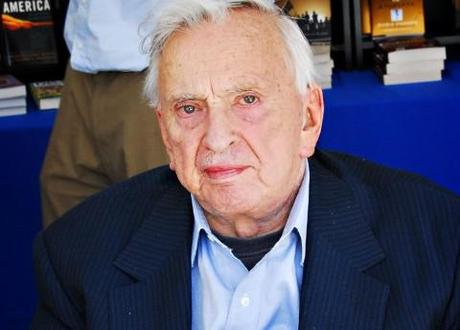 Gore Vidal was a racist, anti-Semimite, and elitist, say some commentators.
Gore Vidal was a racist, anti-Semimite, and elitist, say some commentators.
Gore Vidal, America’s caustically witty and stunningly prolific man of letters, has been dead less than a week and already, the counter obituaries are starting to flood in.
Vidal died on 31 July at the age of 86, after a long career that spanned 25 novels, several high-profile feuds with other literary luminaries, and no end of controversy. The New York Times remembered him as an “elegant, acerbic all-around man of letters”, an unsentimental and unromantic aristocrat, “an Augustan figure who believed himself to be the last of a breed” who was probably right. Others, however, are remembering him a lot less fondly.
Vidal, after Norman Mailer punched him in the face at a dinner party: “Words fail Norman Mailer yet again.”
Gore Vidal was a racist
Noting that while it’s rarely appropriate to speak ill of the dead, “there are people whose malevolence gets airbrushed out in the media frenzy following their death, and it’s proper to speak up,” wrote David Greenberg at Slate. Vidal is one such person, a “thoroughgoing nativist and bigot” and “not someone who deserves to be spared the rigors of a reckoning”. Others acknowledged that Vidal had never met a conspiracy theory he couldn’t get behind, especially later in life, but many also excused that as eccentricity or old age. “Vidal’s extreme late-in-life beliefs, however, weren’t deviations from an otherwise noble record. They were the natural progression of thought in a man whose worldview was fundamentally racist and elitist, motivated by the fear that the reign of his own caste was ending as the walls of aristocratic privilege crumbled in the aftermath of World War II and the Holocaust.”
Gore Vidal once said he didn’t hate anyone, but The Huffington Post begs to differ: They came up with 25 things that Vidal had a problem with, including but certainly not limited to fellow writer Joyce Carol Oates, monotheism and journalists.
Gore Vidal will not rest in peace
Declaring that “peace” is “the thing that Gore Vidal is least likely to rest in”, David Frum, writing at The Daily Beast, called Vidal a “reactionary”, “angry old man” whose anger and obsession tended towards conspiracy theories and an exaggerated sense of injustices done to him personally. Vidal’s public utterances carried the “odour of anti-Semitism” and he seemed to prefer America pre-1865. And what of his literary works? They won’t last: “Too many of his writings have as their theme the great wrong done to him personally by a neglectful country. As his presence fades, so will his aggrieved theme—and then what will be left?”
Gore Vidal was reactionary and repetitive
Vidal, wrote Ron Capshaw at The Daily Caller, “incorporated his boyhood prejudices into his grand theory of history”, including casual anti-Semitism and “virulent racism toward the Japanese”, fueled by his experiences in the Pacific theater World War II. Once he found conspiracy theories, he lost his sense of fairness; once he believed his ideology explained everything, he turned “from an interesting and valuable writer into a reactionary old man who didn’t mind committing the worst sin of the intellectual: repeating oneself.”
More on Gore Vidal
- Write Gore Vidal dies at 86
- The best of Gore Vidal in his own words

